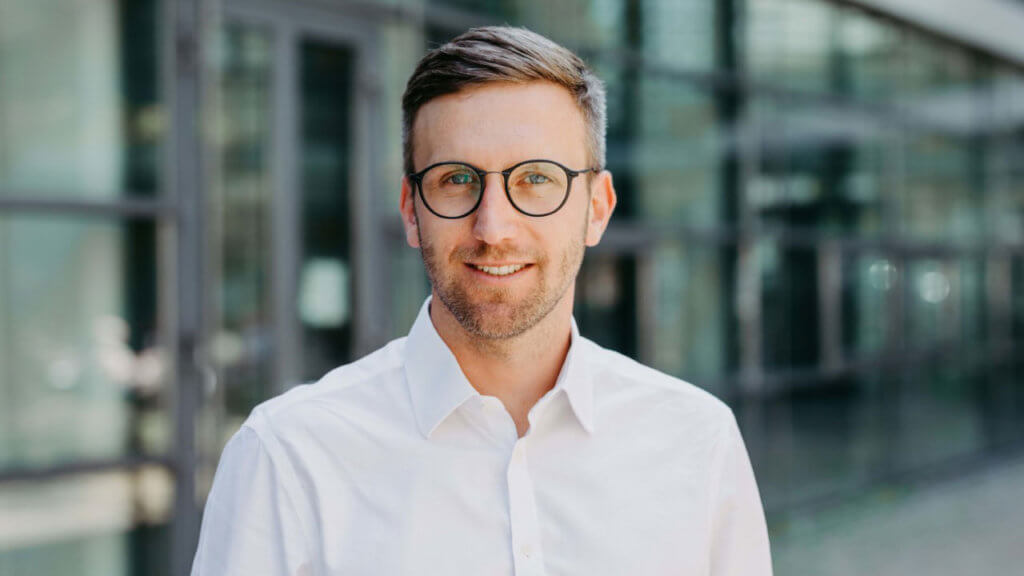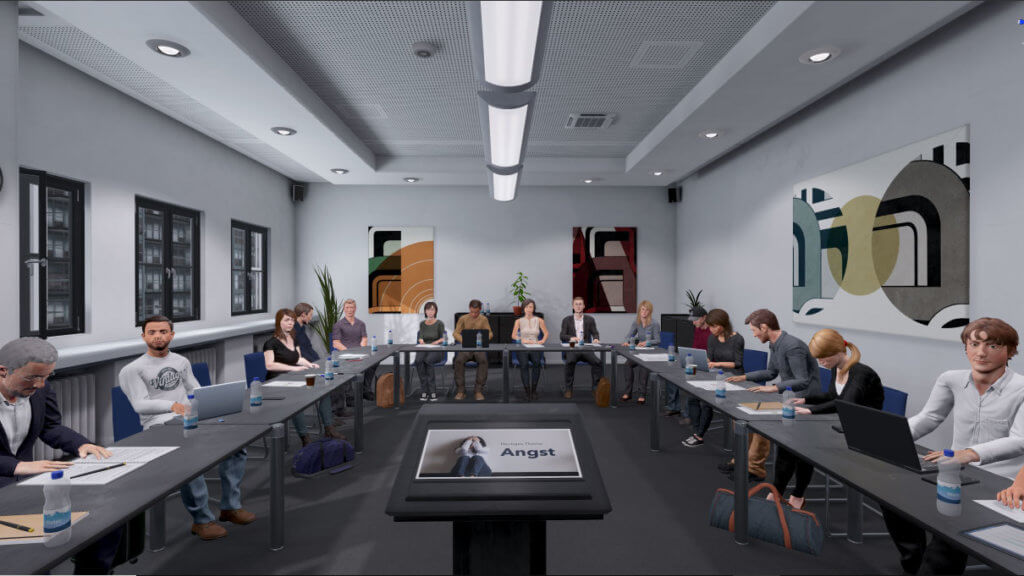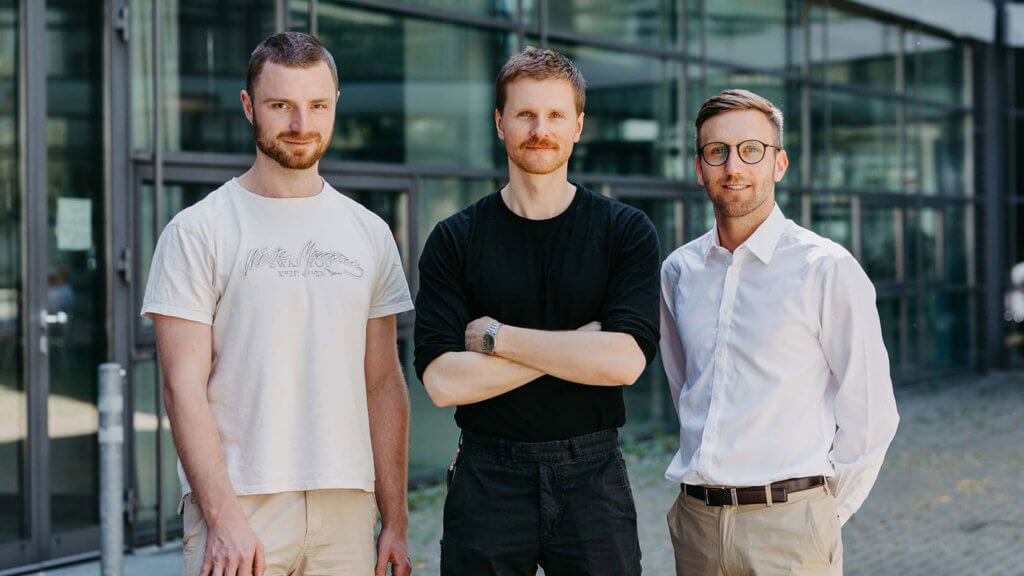Helping people virtually - using VR technology for exposure therapies
Ronja Schrimpf
Shopping in the supermarket, riding the subway, giving a lecture or borrowing a book from the library. All normal situations. Right?
For people with mental illnesses such as anxiety disorders or depression, these supposedly harmless situations can be a great challenge. With VR-based therapy software, the startup neomento aims to improve confrontation or exposure therapies for patients and therapists alike, while at the same time making the therapy more effective, more efficient and less expensive. In an interview with 5-HT, co-founder and CEO Jens Klaubert explains the advantages of virtual confrontation compared to real confrontation and what sets neomento's solution apart from others.

neomento co-founder and CEO Jens Klaubert
Virtual shopping in the supermarket - how does it work?
"In short, we do confrontation therapy for patients with anxiety disorders, addictions, depression and the like in virtual reality. We have developed therapy software for this purpose to confront patients with their fears or problematic situations in VR. This is called exposure therapy and is nowadays ideally done in the real environment," says Jens Klaubert. He is a co-founder of neomento and comes from the business development and financing sector himself. neomento takes this type of therapy to a new level of possibilities with its VR scenarios and extensive integration of the patient's physiological parameters.
"We have developed an extensive portfolio of possible VR scenarios that can be used during therapy," explains Jens. "We have scenarios within buildings, such as a seminar room where the patient is supposed to give a lecture, or a library where the patient has to interact with the staff. But we also have scenarios outside of buildings, for example in public places or on public transport.

neomentos VR scenario presentation in the conference room
Our approach is that neomento's software can be used for as many patients as possible. Therefore we have chosen everyday social situations for our portfolio that are challenging for many people, even if they do not have anxiety disorders. This is why our software is also helpful for other conditions, for example depression, as social interaction is the main focus of our software".
Give a virtual lecture and then go to the library - How does the portfolio work?
"All scenarios are modular, but can also be connected to each other, so that in the end a virtual world is created. This world is peppered with many social interactions and challenges". But neomento's software is not only modular in terms of the individual scenarios: The scenarios themselves can also be structured differently. The scenarios themselves can also be set up differently. This opens up many possibilities for using the virtual world within the therapies - and thus for addressing the difficulties and problems of each individual patient.
"As therapist one can use such a scenario with each patient in a completely different way, depending upon which this patient shows for a symptomatology or disturbance picture. With our software we have created one of the most versatile, if not the most versatile VR therapy on the market. Just the selection of scenarios, interactions and possibilities to combine and adapt them to the individual needs of a patient gives therapists the chance to vary the therapy to a great extent".
Take the subway in your practice or clinic - couldn't that also be done in real life?
neomento brings exposure therapy directly to the clinic or to the psychotherapist's practice. Even if this type of therapy is sometimes already carried out in a real environment, it is very complex, expensive and often not even feasible.
"Many clinics are located in rural areas and are therefore very limited in what they can do with patients in the real environment," explains Jens, "Even the supermarket can be difficult there. Driving with public transportation such as the subway is often not even possible". Of course, it also saves time and money if the therapist and patient do not have to go to the nearest subway station and buy tickets.
"Patient and therapist can thus experience the respective situation directly in the practice or clinic, whether in the supermarket or on the subway. The patient wears the VR glasses and the therapist has a computer in front of him or her to control the situation. The patient can thus experience social interactions without ever having to leave the room".
Borrow a book virtually - Where is the advantage?
One of the decisive differences between neomento and its competitors is the biodata that the startup has integrated into its software: "We also measure various biodata of the patient during therapy, for example heart rate, respiration or whether the patient is sweating. We pass this information on directly to the therapist so that he or she can make an objective assessment of the patient's state of stress. After the therapy, the biodata are also evaluated by our software. At the end of the therapy, the therapist receives a report about what exactly happened in VR and what the patient's matching biodata looked like.
From neomento's point of view, the analysis of biodata offers great added value for an exposure therapy, since it can objectively substantiate a subjective perception of therapy with figures and then make them comparable.
Virtually visiting public places - that feels completely different!
"Often this is the first statement we from neomento hear," laughs Jens, "but you have to keep two crucial things in mind when you ask if it doesn't feel different virtually: First, a patient who has a social anxiety disorder, for example, perceives situations very differently. For him, even shopping in the supermarket is a challenge that most people are not familiar with. In such a stressful situation it is often impossible for these patients to distinguish whether the situation is actually happening in real or virtual life.
And second, our brain is very visual. This means that visual stimuli overlay many other stimuli. So we can pretty much make the brain believe that the situation is real - this is called immersion. The higher the degree of immersion, the more the patient is immersed in the virtual environment. The aim of a VR simulation like ours is to achieve the so-called 'presence', where the patient can no longer distinguish between moving in the virtual and real world. And we can make this possible with our software.“
With its VR simulation, neomento also achieves the necessary therapeutic effectiveness, which has already been scientifically proven - and is therefore in no way inferior to real exposure therapy.
Learn neomentos history virtually - Who is behind the startup?
First attempts of exposure therapy with VR were made about 20 years ago, when war veterans with post-traumatic stress disorder were confronted with their problematic scenarios. It was only about five years ago, however, that the VR technology reached a level of maturity that allowed it to be used in a market outside of research, the military and the like. Therefore, neomento does not have to worry about too many competitors so far.
neomento's idea was born as early as 2017 at the Helmholtz Center in Magdeburg, but from the very beginning it was geared towards later marketability. "Many startups in this field lack the practical suitability that we have been thinking about from the beginning. Although we have a strong research background, we have implemented the project from the beginning with the aim of being able to offer a tool for therapists that is suitable for everyday use later on. For therapists, for example, this means a maximum of one day of training, which they need for the unrestricted use of our software.“
The company was actually founded at the beginning of 2020. neomento is broadly based with five founders. From the technical side with computer science and bioinformatics under CTO Dr. Adam Streck to the creative side with conception and product development under CPO Philipp Stepnicka and the commercial side of the business under CEO Jens Klaubert. neomento is also well positioned on the research side with Prof. Thomas Wolbersaus from the field of neuroscience and VR, and the physician Johannes Achtzehn.

Team neomento: CTO Dr. Adam Streck, CPO Philipp Stepnicka, CEO Jens Klaubert (f.l.t.r.)
Virtual neomento - What are your plans and goals?
"We are particularly interested in investors with smart money, who therefore already have expertise in the healthcare sector, especially in Germany. We are also looking for new employees in many different areas. Clinics and therapists are also of interest to us as potential customers and cooperation partners, as well as research collaborations and universities with whom we can develop and clinically validate products for new disorders," says Jens.
Currently, neomento is about to be approved as a medical device in the EU. The software is currently only available in German, but - as Jens reveals - neomento plans to implement additional product languages as early as next year and then to conquer the European market step by step. This is highly attractive once all the regulatory challenges in Germany have been overcome.
But Jens does not see these regulatory challenges as bad per se: "Of course, the regulatory hurdles are very high, especially in the medical field, especially for startups. But in the digital health sector in particular, the Digital Supply Act gives us in Germany the chance to play a pioneering role throughout Europe. Germany is already praised and admired for its healthcare system. If we can now also make the German healthcare market fit for the future and be the first to implement digital solutions on a broad basis, our healthcare system could remain a pioneer in the future. For me, the German and EU-wide regulations are a quality barrier, a kind of market entry barrier. And neomento's approach is to build such a good product that we can easily meet all the regulatory requirements and even use them to our advantage. That is our attitude as a startup."
Building a virtual network - neomento on the road
As part of Bitkom Digital Transformation Week neomento also attended the Digital Health Conference, which was moderated by 5-HT Strategy & Ecosystems Development Manager Marco Majer. Of course, neomento took the opportunity to pitch its own idea: "For us it was a great opportunity to present our vision of mature VR therapy to a large interested audience! The event was excellently organized and the technical implementation was superb. I also liked the composition of all participants of our slot very much.“
The Digital Health Conference is an opportunity for neomento to expand its own network and become better known. But the collaboration with 5-HT is also intended to help in this process. "In general, we are hoping for greater visibility for neomento and contacts to relevant players in the digital health sector such as health insurance companies, service providers and potential cooperation partners," says Jens, adding with a smile, "Of course it would also be great if one or two investors also learned about 5-HT from neomento.“
5-HT Chemistry & Health Newsletter
Want the latest tech and industry news, events, relevant info from the ecosystem and more?
Subscribe to 5-HT Newsletter now Subscribe to 5-HT Newsletter now
Become part of the 5-HT Chemistry & Health
Exchange ideas with innovative startups and future-oriented companies in our ecosystem. We look forward to meeting you!